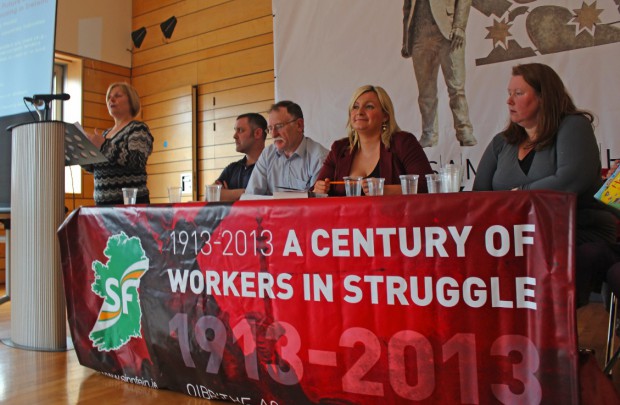13 May 2013
First Annual James Connolly Summer School takes place in Dublin

• The panel on the issue of social housing
The session on ‘The Reconquest of Ireland and Future of the Left' could have taken up the entire school and was very much the beginning of a debate and of the formulation of strategies that need to continue
AT THE OPENING SESSION of the First Annual James Connolly Summer School, Jim Connolly Heron, great-grandson of the great Irish revolutionary, said that his grandmother Ina, Connolly’s daughter, had talked of the idea of a school or college in his honour. Jim said that the Summer School was such a tribute and he commended the organisers
We gathered in Ballybough Community Centre in Dublin’s north inner city on Saturday 11 May, the eve of the 97th anniversary of Connolly’s execution.
The area was the crucible of the Great Lockout and the centenary was marked by Connolly biographer Lorcan Collins, who painted a vivid picture of Dublin in 1913 with its tenement slums, high infant mortality rate and drunken police attacking locked-out workers and their families.
Roger Cole of the Peace and Neutrality Alliance (PANA) spoke of Connolly’s role in founding the Irish Neutrality League on the outbreak of the Great War in 1914. Roger pointed out that the linking of Irish sovereignty and neutrality went back to Wolfe Tone who published his pamphlet ‘The Spanish War’ in 1790 (it was republished by Cumann na mBan in 1914 and again by PANA in recent years).
James Connolly Heron described the battle to save Moore Street, last meeting place of the Provisional Government in 1916. He pointed out how Chartered Land developer Joe O’Reilly is being paid by the taxpayer through NAMA while his company plans to level most of the historic 1916 battlefield site. Jim spoke of the determination of the relatives of the leaders and of campaigners to stop this and save a heritage area of international importance.
From developers, aided and abetted by the state, destroying our history, we moved to developers, again aided and abetted by the state, making people homeless. This was the fate of the residents of Priory Hall and Residents Committee member Graham Usher received a very warm welcome when he addressed the school. He said that while the saga had shown the worst of developer greed and state neglect it had also shown “the best people have to offer” with the residents getting organised and receiving widespread public support.
Dublin Sinn Féin City Councillor Críona Ní Dhalaigh described the horrendous conditions endured by many residents in her area in Council housing accommodation where promised regeneration was not delivered. She spoke of the dire shortage of social housing and the strain this is putting on thousands of families. Sinn Féin Housing spokesperson Dessie Ellis TD, addressing the mortgage debt crisis, said:
“There are 198,000 households with distressed mortgages and over 30,000 rental properties in serious trouble. This is a major catastrophe just waiting to happen. The Government has not sought any real reform to help people stay in their homes or resolve unpayable debt. We have had no independent case-by-case debt resolution process established and lenders have been given a veto over any proposed solutions with homeowners.”
Michelle Norris, Chair of the National Housing Finance Agency, made an interesting presentation on the funding of social housing. She proposed a thought-provoking solution. Councils are currently prevented from borrowing to build homes because such debts would be counted as part of the national debt. She urged that councils set up housing associations which could then borrow to construct homes for people on the housing waiting lists.
The final session of the school was on ‘The Reconquest of Ireland and Future of the Left’. This could have taken up the entire school and was very much the beginning of a debate and of the formulation of strategies that need to continue.
Political journalist Eoin Ó Murchú urged both Sinn Féin and the Left within the Labour Party to challenge the received wisdom that the euro currency is sacrosanct.
Paul Dillon of the Campaign for Labour Policies said we need to ask the purpose of austerity, pointing to the transfer of wealth to the already wealthy. He said that, in the longer term, it is necessary to try to raise the expectations of the working class.
Michelle O’Donoghue, Chair of the National Women’s Council, posed the question ‘What is the Left?’ and urged the need for progressive politics to be seen to be relevant to people’s lives.
Eoin Ó Broin asked if a left-wing government is possible and said that while much has been done by Sinn Féin and others to present real alternatives to austerity, much more is needed.
In discussion from the floor, key issues raised included the centrality of ending partition (which speakers felt should always be to the fore) and the point that the reconquest of Ireland must also mean the complete liberation of women.
The sessions were ably chaired by Aengus Ó Snodaigh TD, Sinn Féin Social Protection spokesperson, Ballymun Sinn Féin representative Noeleen Reilly, and Mary Roche of the party’s Oireachtas team.
It can be safely said that the James Connolly Summer School, hosted by Sinn Féin Átha Cliath, was a success and has now established itself as an annual event, in the run up to the centenary of the 1916 Rising and beyond.
See more pictures »
Follow us on Facebook
An Phoblacht on Twitter
Uncomfortable Conversations

An initiative for dialogue
for reconciliation
— — — — — — —
Contributions from key figures in the churches, academia and wider civic society as well as senior republican figures





